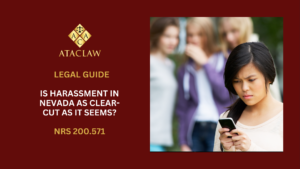In the bustling streets of Las Vegas and across Nevada, the line between what constitutes normal behavior and harassment can sometimes blur. At ATAC LAW, we frequently encounter cases where individuals find themselves on the wrong side of harassment charges — often perfectly innocent people whose actions were misconstrued or who were unjustly accused. Understanding the intricacies of NRS 200.571 – the statute that delineates the crime of “harassment” in Nevada – is crucial for navigating these complex waters.

When Does an Action Cross into Criminal Harassment Territory in Nevada?
Harassment encompasses a wide array of behaviors under Nevada law, where the key factor is the intent to instill fear through threats of harm. Harassment in Nevada is defined by actions or words intended to threaten another person to the extent that the individual feels that the threat could realistically be carried out. This could involve:
- Threats of physical injury,
- Damage to someone’s property,
- Confining or restraining someone against their will,
- Any other actions intended to inflict significant harm on someone’s physical or psychological well-being.
What makes Nevada’s harassment laws particularly broad is the stipulation that the threats don’t need to be immediate. Even threats of future harm can qualify as harassment, making it essential for individuals to understand the broad implications of their actions and words.
Harassment vs. Stalking:
While both harassment and stalking involve inducing fear of harm, they differ slightly in their execution. Harassment explicitly involves direct threats made through words or overt actions. On the other hand, stalking typically includes behaviors that aim at forcing unwanted interaction or contact with the target.
How Can You Effectively Contest Harassment Charges in Nevada?
Facing harassment charges in Nevada can be daunting, with the potential for serious consequences if not addressed properly. However, it’s important to recognize that a charge is not a conviction. There are defenses you can assert, and with the right approach, it’s possible for the charges to be dismissed or reduced. Here, we outline strategies that could be employed to challenge such accusations.
The burden of proof rests with the prosecution, which means they must demonstrate that you are guilty “beyond a reasonable doubt.” Without concrete evidence, it’s not unusual for cases based largely on testimony to be dropped or negotiated down.
To effectively counter harassment charges, your legal team might consider several defense tactics, such as:
- Asserting that you were defending yourself when the incident occurred.
- Challenging the credibility of the alleged victim by showcasing inconsistencies in their account.
- Arguing that your actions did not meet the legal standard required to be deemed harassment.
- Citing “lawful authority” as the basis for your actions, which might apply if you are a security professional or law enforcement officer acting within the bounds of your duties.
- Claiming protection under constitutional rights, including freedom of speech and the right to peaceful assembly.
What Are the Legal Consequences of Harassment Convictions in Nevada?
In Nevada, the severity of penalties for harassment convictions varies significantly based on several factors, including the nature of the harassment, whether it’s a repeat offense, and the medium through which the harassment was conducted. Understanding these potential legal consequences is crucial for anyone facing harassment charges in the region.
First-Time Offenders:
For individuals convicted of harassment for the first time in Nevada, the offense is treated as a misdemeanor. The potential penalties include:
- A maximum of six months in jail, and/or
- A fine reaching up to $1,000.
Repeat Offenses:
For those with prior harassment convictions, the charges escalate to gross misdemeanors, carrying heftier penalties:
- Up to 364 days in jail, and/or
- A maximum fine of $2,000.
Enhanced Charges for Severe Threats:
When the harassment incites fear of serious physical harm or death in the victim, the charges can be elevated to category B felonies, with significantly harsher sentences:
- Two to fifteen years in prison, and
- A possible fine of $5,000.
Online Harassment:
Harassment perpetrated through digital means, such as the internet or text messaging, may result in category C felony charges. These come with:
- One to five years in prison, and
- A potential fine of up to $10,000.
Protective Orders and Their Violations:
In harassment cases, Clark County judges frequently issue protective orders against the accused, mandating they stay away from the victim for a set period. Violating these orders carries its own set of penalties:
- Intentionally breaching a temporary protective order is a gross misdemeanor, punishable by up to 364 days in jail and/or a $2,000 fine.
- Deliberately violating an extended protective order is classified as a category C felony, with consequences including one to five years in prison and possibly a $10,000 fine.
Facing harassment charges in Nevada, whether in Las Vegas or broader Clark County, demands proficient legal expertise. ATAC LAW is committed to offering defense strategies that consider every aspect of your case, ensuring a comprehensive understanding and robust representation in the face of such charges. Identifying when behavior qualifies as criminal harassment is essential, particularly in Las Vegas where interactions can often be misinterpreted. Whether you’re contesting a harassment allegation or seek clarity on Nevada’s harassment laws, ATAC LAW provides the necessary legal guidance to navigate these challenges effectively.
For further legal assistance and to discuss your case with an expert, don’t hesitate to contact ATAC LAW.
